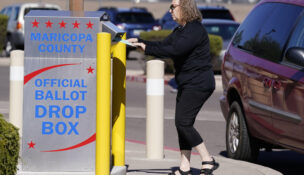Arizona officials shift focus to secure state’s share of Colorado River
Reagan Priest Arizona Capitol Times//July 30, 2025//
Arizona officials shift focus to secure state’s share of Colorado River
Reagan Priest Arizona Capitol Times//July 30, 2025//
Key Points:
-
Officials celebrated the passage of Ag-to-Urban groundwater legislation on July 29, but noted more work needs to be done
-
Gov. Katie Hobbs and Republican Sen. T.J. Shope are setting their sights on ongoing Colorado River negotiations
-
Shope said lawmakers are beginning to discuss a “game plan” for legislative approval of a potential Colorado River agreement
Arizona officials are celebrating the passage of new groundwater legislation, but setting their sights on getting Colorado River negotiations across the finish line in 2026.
At a bill signing for Sen. T.J. Shope’s “Ag-to-Urban” legislation, Gov. Katie Hobbs, state lawmakers, local officials and farmers said the bill was a step in the right direction for water conservation. But almost all of those officials also acknowledged that it is only one piece of the puzzle.
The legislation allows housing developers operating under water restrictions to purchase the water rights of farmers heading into retirement. The governor anticipates it will result in the construction of tens of thousands of homes and the conservation of 10 million acre-feet of water, yet that alone may not be enough.
“Ensuring that Arizona gets our fair share of Colorado River water is critical,” Hobbs told reporters after the signing. “It’s maybe the most critical issue in front of us in terms of water management.”
Shope, a Republican, said during the bill signing that he is already looking “upward and onward” to the Colorado River.
“We have a tough road ahead of us with Colorado River negotiations,” Shope said. “Arizona must have a united front as we approach the Colorado River.”
Arizona’s share of the Colorado River water, which is split between seven Western states, remains undecided as the states renegotiate their agreement to divvy up the water. Negotiations have been tense due to disagreements over which states should bear the brunt of usage cuts, but an agreement could be on the horizon.
The Lower Basin states, Arizona, California and Nevada, put a new proposal on the table in late June, which seems more agreeable to the Upper Basin states, Colorado, New Mexico, Utah and Wyoming. The new proposal would use a formula to determine how much water each state gets based on actual water flows from the river in preceding years.
A new agreement to replace the original Colorado River Compact must be in place by October 2026 and the federal government is warning that if a draft agreement isn’t on the table by Nov. 11, federal officials will intervene. The agreement must go through environmental review and be approved by Congress in order to take effect.
Arizona will face a unique hurdle in the process of adopting a new compact: legislative approval. Shope said Arizona is the only Colorado River state that requires its legislature to approve any agreement the governor enters into.
“It’s something that I’m ready to dive head first into,” Shope told the Arizona Capitol Times.
Getting a majority of Arizona’s 90 lawmakers to agree to support a new Colorado River Compact could be tough. Groundwater has been a particularly sensitive issue in the Legislature, with Republican Rep. Gail Griffin largely seen as the arbiter of water legislation in rural communities.
Griffin has long opposed any groundwater management proposals that restrict farmers or take away local control from rural cities and counties. Arizona could face drastic cuts to its Colorado River supply under various proposed agreements, which would be a hard sell for Griffin and other rural lawmakers.
The Republican-controlled Legislature may also be reluctant to give Hobbs any wins before her reelection campaign in 2026.
Additionally, many lawmakers are unhappy with the Department of Water Resources and its director Tom Buschatzke, who is representing the state in Colorado River negotiations, over their handling of groundwater management in the state.
Ultimately, lawmakers still have time to create a “game plan” for legislative approval of any Colorado River deal, Shope said. He said those conversations are beginning to take shape, and he hopes recent compromises like the Ag-to-Urban bill will help build momentum for future bipartisanship on water issues.
“As long as I’m around, we’re going to try to find that consensus, to make sure that we’re all speaking with one united voice so that Arizona is in the prime position to continue to grow,” Shope said.
And all of those conversations rely on the Colorado River states coming to an agreement, which is still tenuous. If the federal government intervenes as promised, it could prompt lawsuits, for which Hobbs noted the state is fully prepared.
“It is critical that Arizona is not taking the brunt of federal cuts that will result if we don’t get a fair deal,” Hobbs told reporters. “I was able to secure $3 million in the state budget that ensures that we’re ready to fight for our share if we have to. But I’m hopeful that we can come to some resolution.”













































